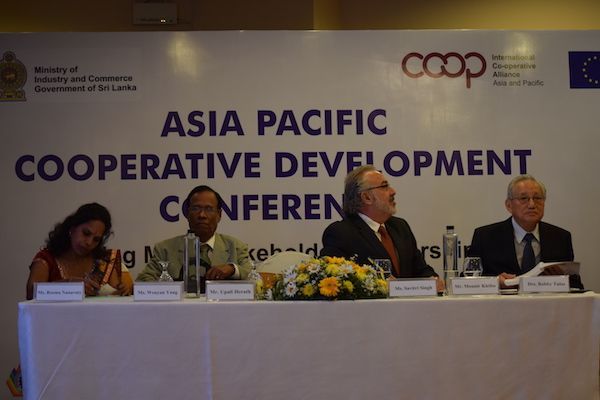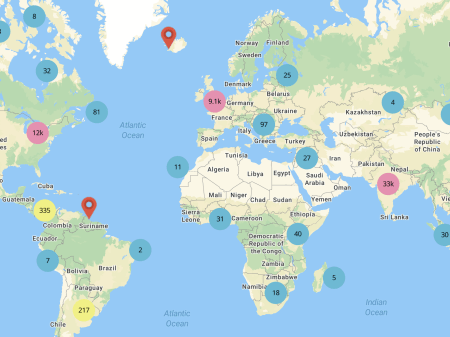
Work to create new partnerships between co-operatives and stakeholders to drive development was discussed at the Asia-Pacific Co-operative Development Conference (APCDC) in Sri Lanka last month.
The panel on ‘Eradicating Poverty: Opportunity, Protection and Empowerment’ sawa variety of speakers representing stakeholders from inside and outside the co-operative movement. It was moderated by Dr Tulus, a Former Regional Director of ICA-AP. Speakers included Ms Savitri Singh, Program Director, ICA-AP; Mr Upali Herath, Managing Director of Co-operative Insurance, Sri Lanka; Mr Mounir Kleibo, ILO, Palestine; Ms Jeyavathany Thillainadarasa, SEWA, Sri Lanka; and a video presentation by M. Wenyan Yang, Chief of Social Perspective on Development Branch, Division of Social Policy & Development, Department of Economic and Social Affairs, UN, New York.
Ms Singh highlighted the concentration of wealth in the hands of world’s richest 1%. She said tackling poverty was the original purpose of the co-operative model, and remains the driving force for co-operatives in many parts of the world. Co-operatives place emphasis on job security and improved working conditions, pay competitive wages, and promote additional income through profit-sharing and dividends.
Mr Upali Herath showed how co-operatives provide security to the poor by allowing them to convert individual risks into collective ones. He gave examples including the Thrift & Credit Co-operatives, AMUL Dairy Co-operatives, and consumer co-operatives in Sri Lanka during the Second nd World War.
Sustainable production also plays a crucial part in helping members who face hardship. Sustainable agricultural practices have been introduced for water conservation, soil conservation and organic farming in Sri Lanka. After some farmers committed suicide because of heavy debt burdens from agricultural loans, co-operatives organised a centre for educating farmers on low-cost organic methods of farming in Polonnaruwa.
Mr Mounir Kleibo of the ILO, Palestine, explained the concept of ‘de-development’. In the context of the prolonged humanitarian crisis in Palestine, he said: ‘De-development is defined as a process which undermines or weakens the ability of an economy to grow and expand by preventing it from accessing and utilising critical inputs needed to promote internal growth beyond a specific structural level.’
The people of Palestine face a growing economic and social crisis but the new co-operative law is expected to undo some of the long-term damage they have suffered. The plan is to create a National Co-operative Commission (NCC)o ensure greater coordination in the co-operative movement; compile data on different co-operative sectors; and approve projects funded by the donor community to develop the co-operative sector. The NCC will bring hope for the 25.8% of Palestinians living under the poverty line.
Ms Yang said co-operatives already play an important role in realising the SDGs because their fundamental structure ‘strengthens the means of implementation and revitalises the global partnership for sustainable development’. In certain countries, co-operatives are the mainstay of livelihoods and the only route out of abject poverty. She gave the example of Kenya, where 63% depend on co-operatives for employment. She urged the co-operative giants to contribute financial resources to fund the development efforts of the global co-operative movement.
Last , we heard the presentation made by SEWA, Sri Lanka representative, Ms Jeyavathany, who described the important work being undertaken by her organisation with economically and socially marginalised women in three districts in Sri Lanka. SEWA has empowered these women by giving them essential skills, such as computing and , food processing, to start their own businesses.
The Panel on Eradicating Poverty provided much food for thought. It echoed what we already know about how the co-operative movement creates buffers against future risks for their members, and also broadened our understanding by discussing the role of co-operatives in conflict areas. It reaffirmed our faith in co-operatives as agents who can alleviate poverty, and give members a decent means of living and a dignified life.
The APCDC was organised on the theme Building Multi- Stakeholder Partnerships on Sustainable Development at Hotel Galadari, Colombo (Sri Lanka) from 27-28 Feb 2018. It was co-organised by the International Co-operative Alliance - Asia and Pacific (ICA-AP), ICA-EU Partnership on Co-operatives in Development: People Centered Businesses in Action (#coops4dev) and the Sri Lankan co-operative movement led by the National Co-operative Council, Consumer Co-operative Federation, SANASA Federation, Kotikawatta Thrift & Credit Co-operative and National Institute of Co-operative Development.
More information on http://www.ica-ap.coop/.
This article has been co-funded by the European Union. The contents of this article are the sole responsibility of the International Co-operative Allianc and can in no way be taken to reflect the views of the European Union.
Photo: Asia-Pacific Co-operative Development Conference (APCDC) in Sri Lanka (c) ICA-AP





